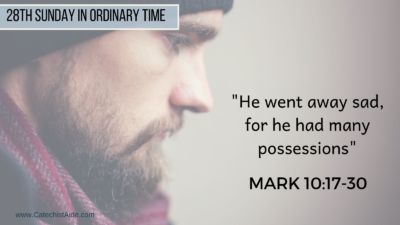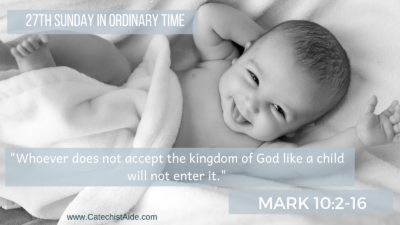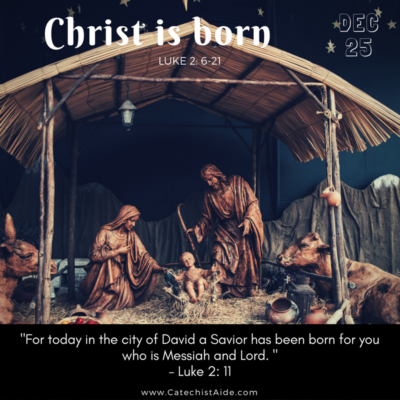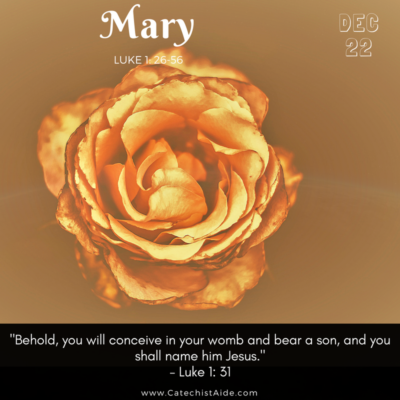Sunday, October 14, 2018
28th Sunday in Ordinary Time (Cycle B)
Today’s Gospel reading is Mark 10:17-30, The Rich Man.
Desiring God
The rich young man in today’s gospel is eager to inherit eternal life. We read that he ran to Jesus and knelt before him. He greets Jesus as “good teacher” so we can assume that he has been listening to Jesus preach. It appears that the man wants to move beyond just hearing the word of Jesus. He has tapped into something that resides within each of us. Created in God’s image, we were made to know and to love our Creator. We were made to be in relationship with God. This is the “God-shaped hole in the heart of every man” that Blaise Pascal referred to. Pascal said that within each of our hearts is a longing – a desire for something which is not of this world – and which can only be satisfied by God himself. The rich man in Mark’s Gospel has found in Jesus, the one thing that fills his heart to overflowing, and now he wants to have it for all eternity. So, he asks the question, “what must I do to inherit eternal life?”
Minimum Requirements
Jesus responds first with his own question. He asks the man if he has kept the commandments given to Moses.
My daughter is a personal trainer, and when she gets a new client, the first thing she does is a sort of inventory to determine where they are now so she can develop the proper plan to get them where they want to go. If this young man had gone to a personal trainer and asked for advice on how he can create more muscle mass, the trainer would probably start by asking about his general health. The trainer would want to know if he is eating a healthy diet, exercising regularly, getting the proper rest, etc. She might suggest that he get rid of junk food and sodas and concentrate on getting his required daily nutrients. But that’s just the starting point. The trainer would also point out that, if you’re really interested in changing your body composition, you’ll also need to commit to a rigid workout and training schedule. Likewise, keeping the commandments, while essential to fostering a good relationship with God, is a kind of minimum daily requirement for us. When Jesus asks if he keeps the commandments, he is asking, are you doing the bare minimum?
Total Commitment
Moving beyond the minimum, we must tear down any obstacles that stand between God and us. To be in right relationship with God, we must rely entirely on him, not ourselves. In the reflection for last week’s gospel, we said that eternal life is a gift that God offers to us. It isn’t forced on anyone, and we are free to say, “No, thank you.” To accept God’s gift of eternal life, we must be like little children – utterly dependent on Him. We can’t be the one in control. And this is essentially what Jesus is telling the rich man today. Jesus says that if he wants to have a deeper relationship with God – if he wants to go “all in” – then he must let go of his wealth. When Jesus tells the rich man to give everything he has to the poor and follow him, he is asking him to trust God completely. By giving away his earthly treasure, the rich man will find an even greater treasure. Jesus wasn’t making a bargain with the man. The “letting go” was the only way he would experience true charity and giving of self. This is the love that God wants us to experience with one another. This is the love for which we were created.
Who Can Be Saved?
We read that the rich man “went away sad, for he had many possessions.” Jesus lamented, “how hard it is for those who have wealth to enter the kingdom of God.” He said this, not because wealth is a sin, but because it’s so easy for those with wealth to rely on themselves rather than trust in God. We don’t know what happened to the young man in Mark’s Gospel after his encounter with Jesus. Change is never easy, but Jesus tells us that with God anything is possible. I like to think that the rich man went home and thought about what Jesus asked him to do. Even though he couldn’t fully commit that day, perhaps he was able to take a first step by letting go of one possession, and then another and another. What is the first step that we can make today that will move us toward giving our whole selves and trusting God completely? What can we do today so that we don’t walk away sad?
© 2018 Catechist’s Aide





